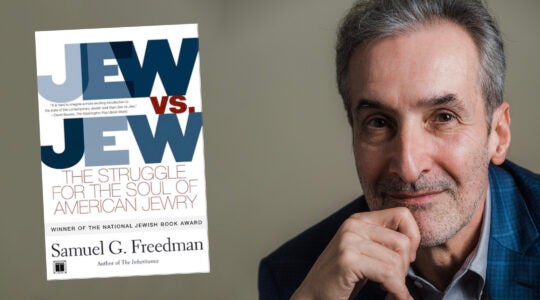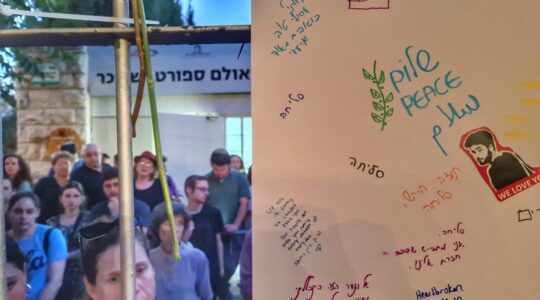To commemorate the passing last month of Sara Lamm Dratch, her friend (and mine) Dr. David Shatz delivered a lecture in her honor. He focused on the events that transpired at the bottom of Mt. Sinai, rather than on the miracle at the top, which we celebrate on Shavuot. He elaborated on the fate of the original divine two tablets, violently broken there by Moses in a fit of rage upon witnessing the golden calf, a salient manifestation of our human imperfections.
He pointed out the subsequent existence of not one, but two arks that accompanied the wandering Jews. One, of course, contained the new tablets; the other enclosed the shattered remains of the original. Pointedly, it was the latter that led them on their sojourn thru the desert, while the former remained in their midst. It was only when they engaged in battle that the new tablets were in front.
David related how, similar to our carrying both arks, our people’s narrative, which we carry with us, also recounts our failures, as well as our victories. This is often recapitulated by our individual family histories, which should also contain both. From a psychiatric perspective, this is a necessity. Parents need to let their children know about their mistakes, both past and current, as much, if not more, than about their achievements. Our collective stories should always carry two arcs, with opposite trajectories.
As in the desert, when we are successfully moving forward in life, we should advertise our many missteps along the way. Otherwise, our children will imagine that their many doubts and ill-advised moves are unique to them. It will confirm their inevitable fears of their own inadequacies, especially in contrast to their seemingly infallible parents. We need to remind them, as well as ourselves, that, like the generation of the desert, we all have imperfections. We should never discard our broken tablets.
At the best of times, our greatest liability is our own hubris. I can still remember 40 years ago the explanation given by Sara’s father, Dr. Norman Lamm, of the enigmatic aphorism that the best of physicians is destined for hell. When we consider ourselves the best, when we lose our humility, is precisely when, whether as physicians or as parents, we become most vulnerable to truly cataclysmic mistakes. The three most important words in every doctor’s vocabulary should be:” I don’t know.” Our imagined omniscience lubricates our slope to damnation.
On the other hand, when we face a crisis, when we are at war, whether with an external adversary, or with our own internal demons, we need to remember our triumphs. This is not the time to display our broken tablets. We need to be reminded how we vanquished seemingly insurmountable foes in the past. We need to be assured that this saga will also have a happy ending.
Why was this standing-room-only lecture by David Shatz delivered at all? When a posthumous tribute is offered, which is hardly the norm (though it should be), it is invariably brief and extemporaneous, and delivered in private, to family members only. Why was there such a public commemoration of Sara’s passing?
There are at least three reasons. The first is that Sara’s saga did not have a happy ending. While, in a sense no life ever does, Sara’s passing was uniquely premature. Though she never smoked, she was shattered by a lung cancer that violently raged through her. Though she was the youngest of four siblings, she was buried by not only them, her husband and children, but by her parents, as well. This celebration of her life was a feeble attempt to protest the inequity of her death.
The second reason is that Sara came from what could be described as the first family of modern Orthodox Judaism. Her father served as the rabbi of The Jewish Center, as well as the president and chancellor of Yeshiva University. In a metaphorical sense, Sara was raised on the top of the mountain.
There is a third reason, perhaps the most important of all. Though Sara was born at the top of the mountain, she was extraordinarily grounded. She not only acknowledged her own imperfections, but she also embraced everyone else’s. No one was more down to earth.
Her brother, Dr. Josh Lamm, is not only my friend, but also my professional partner. Sara assisted him in trying to repair those “broken tablets” who have been unable to withstand the vicissitudes of life. He admitted in his eulogy that though he was the physician, she was the healer. He prescribed their medications; she mended their spirits. As one of our patients facetiously shared with me, she made appointments to consult him as excuses to see her. If the best of physicians is destined for hell, there can be no question of the destination of the humblest of healers.
Those of us who knew someone who died prematurely can’t help but carry with us two arks. One contains the broken tablets, the painful memory of their departure. The one, however, that leads us through our challenging existence, the one that sustains us at the worst of times, and elates us at the best, is the other ark, the memory of the joy that was their life.
Dr. Isaac Herschkopf, a frequent columnist in The Jewish Week, is the president of the NYU- Bellevue Psychiatric Alumni and the author of Hello Darkness, My Old Friend: Embracing Anger to Heal Your Life.
The New York Jewish Week brings you the stories behind the headlines, keeping you connected to Jewish life in New York. Help sustain the reporting you trust by donating today.




